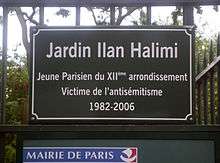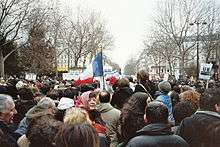Killing of Ilan Halimi
| Ilan Halimi | |
|---|---|
 Ilan Halimi | |
| Born | 11 October 1982 |
| Died |
13 February 2006 (aged 23)[1] Paris, France |
| Cause of death | Injuries from torture |
| Occupation | Cell phone salesman |
The killing of Ilan Halimi (Hebrew: אילן חלימי) was the kidnapping, torture, and murder of a young Frenchman of Moroccan Jewish ancestry in France in 2006. Halimi was kidnapped on 21 January 2006 by a group calling itself the "Gang of Barbarians". The kidnappers, believing that all Jews are rich, repeatedly contacted the victim's modestly placed family demanding very large sums of money. Halimi was held captive and tortured for three weeks, and died his of the injuries. The case drew national and international attention as an example of antisemitism in France.[2]
Kidnapping


Halimi was a cell phone salesman living in Paris with his divorced mother and his two sisters.[3]
On 20 January 2006, one of the perpetrators, a 17-year-old girl called "Emma" or Yalda[4] (of French-Iranian origin),[5] came to the phone store in Paris where Halimi worked and struck a conversation with him. She eventually asked for Halimi's number, which he gave to her, and left the store. The girl called him the next evening and told him to come to her apartment for a drink. He was lured to an apartment block in the Parisian banlieues.[6][7] where he was ambushed and held captive by the group upon arrival. No one saw or heard from Halimi until the next afternoon, when his sister received an email containing a picture that showed Hamili gagged and tied up to a chair with a gun to his head. In text, the abductors threatened his life and demanded 450,000 euros from his family, stating that they would kill him if they went to the police. Not having the money, though, Hamili's family had no other option than to contact the police.[8]
The abductors, who called themselves the "Gang of Barbarians", tortured him and sent phone and video messages to his family while they were in contact with the police. During the 24 days of abduction, the leader of the gang, Youssouf Fofana, managed to travel back and forth to his home country of Ivory Coast. At some point he was suspected of being related to the gang and was taken to the police station, but they were forced to release him due to a lack of proof of his connection to the group. The demand for ransom, initially elevated at 450,000 euros, diminished as the abductors got more anxious with the attention they were drawing from the police and media. Suspicious neighbours said they did not go to the police station out of fear while others said they did not want to intervene in a business that was not theirs.
After three weeks and no success in finding the captors, the family and the police stopped receiving messages from the captors. Halimi, severely tortured, more than 80% burned and unclothed, was thrown next to a road at Sainte-Geneviève-Des-Bois on 13 February 2006. He was found by a passer-by who immediately called for an ambulance. Halimi died from his injuries on his way to the hospital.
Some have criticized the police department for not understanding the antisemitic nature of the kidnapping. Their decision to keep certain matters secret was seen as counter-productive, and may have prevented a facial composite of "Emma", the girl who lured Halimi to the apartment.[9] Investigation showed that more than twenty people, some of them teenagers, took part directly or indirectly in the kidnapping. Some of them later claimed they never knew his fate, and "Emma" (who was seventeen at the time), later sent a letter to his family to say how sorry she was.
A woman, referred to as Audrey L., turned herself in after the police had released a facial composite picture. She pointed to the Barbarians, a gang of African and North African immigrants who had perpetrated similar abductions in the past. In the subsequent days, French police arrested 15 persons in connection with the crime. The leader of the gang, Youssouf Fofana (born 1980), who had been born in Paris to parents from Côte d'Ivoire, fled to his parents' homeland together with the woman used as bait.[10] They were arrested on February 23 in Abidjan and extradited to France on March 4, 2006.
Reburial in Israel
Halimi was initially buried in the Cimetière parisien de Pantin. At the request of the family, the remains of Ilan Halimi were reburied in Har HaMenuchot cemetery[11] in Israel on Friday, February 9, 2007.[12] It was timed to allow his first Yartzeit, on Tu Bishvat, to pass before the reburial.[13] The date and time (11:30 am) also marked "exactly one year after his burial in France according to the Jewish Calendar."[14]
Aftermath

Tens of thousands of people marched through the streets of Paris, demanding justice for Halimi, on Sunday February 26, 2006.[15] The kidnapping brought many Jews to speak out against antisemitism and racism, but also stirred discussion about whether Jews could still feel safe in France or not. Immigration to Israel rose as a result.[9]
A total of 27 people were accused of involvement in the crime and were tried for kidnapping and murder in 2009. One person was acquitted and the rest were convicted. Gang leader Youssouf Fofana was sentenced to life imprisonment with a minimum of 22 years before the possibility of parole. The woman who had lured Halimi to his abduction was sentenced to nine years imprisonment. Two of his close associates, Jean-Christophe Soumbou and Samir Ait Abdel Malek, received 18 and 15 year prison terms respectively, and Malek's prison term was later increased to 18 years upon appeal. Six others convicted over their involvement received sentences ranging from 12 to 15 years imprisonment, and seven others received sentences ranging from 8 months to 11 years imprisonment.[16] While Fofana chose not to appeal his sentence, 14 of the 27 verdicts were appealed by the prosecution.[17] The convictions were upheld on appeal in December 2010.[18] In 2017, a Paris court sentenced Fofana to an additional 10 years imprisonment for other extortions he had committed.[19]
Ilan Halimi was initially buried in the Cimetière parisien de Pantin near Paris. The funeral in Paris drew a large Jewish crowd. He was reburied in Har HaMenuchot cemetery in Jerusalem, Israel on February 9, 2007.[20] A garden in the Jerusalem Forest was named after him. In May 2011, a garden in the 12th arrondissement of Paris where Halimi used to play as a child was renamed after him.[21]
His mother, Ruth Halimi, published a book she wrote together with Émilie Frèche about her experience of the events, called 24 jours: la vérité sur la mort d’Ilan Halimi. In late April 2014, a movie by French filmmaker Alexandre Arcady about this case was released. Entitled 24 Jours: La vérité sur l’affaire Ilan Halimi (24 Days: The Truth about the Ilan Halimi Case), it is based on the above-mentioned book.[22]
In 2017 the Washington Post revisited Ilam Halimi's murder, describing it as similar to the murder of Sarah Halimi [23][24]:p.35 (Ilan is only distantly related to Sarah Halimi, who was also Jewish), because French authorities similarly refused to acknowledge the antisemitic nature of the murder or to investigate it as ethnically and ideologically motivated terrorism.[25]
References
- ↑ König, Yaël (March 20, 2006). "Entretien avec Ruth Halimi" (in French). Primo-Europe. Archived from the original on May 4, 2009. Retrieved 2008-12-30.
- ↑ Fields, Suzanne (April 3, 2006). "The Rising Tide of Anti-Semitism". The Washington Times. Retrieved 2008-12-30.
- ↑ Tale of Torture and Murder Horrifies the Whole of France, Michel Gurfinkiel, The New York Sun, February 22, 2006.
- ↑ Campbell, Matthew (April 2, 2006). "Barbarians of suburbs target French Jews". World News. London: Times Online. Retrieved May 12, 2009. (subscription required)
- ↑ Smith, Craig S. (March 5, 2006). "Torture and Death of Jew Deepen Fears in France". The New York Times. Retrieved May 11, 2009.
- ↑ McNicol, Tracy (28 April 2014). "A Horror Story of True-Life Anti-Semitism in France". Daily Beast.
- ↑ Rotella, Sebastian; Achrene Sicakyuz (February 26, 2006). "Parisians Stare at the Evil Within". Los Angeles Times. pp. A-1. Retrieved 2008-12-30.
- ↑ The Shocking Murder of Ilan Halimi, Aish HaTorah
- 1 2 Frèche, Emilie (2009). 24 Jours. France: Seuil. ISBN 978-2-02-091028-6.
- ↑ Michel Gurfinkiel (February 22, 2006). "Tale of Torture and Murder Horrifies the Whole of France". The New York Sun. Retrieved July 29, 2014.
- ↑ Brett Kline (July 16, 2009). "Trials and Tribulations". The Jerusalem Post. Retrieved July 29, 2014.
- ↑ 20Jerusalem%2011-Feb-2007{}
- ↑ "Hundreds Attend Reburial in Jerusalem of French Jew Murdered in Paris". The Jewish Federations of North America, Inc. Retrieved July 29, 2014.
- ↑ "The remains of Ilan Halimi, murdered in Paris last year in a vicious antisemitic attack, will be reburied in Jerusalem on Friday" (Press release). Jewish Agency for Israel. February 7, 2007. Retrieved July 29, 2014.
- ↑ Article on the European Jewish Press website
- ↑ https://www.haaretz.com/jewish/1.5094848
- ↑ "'Gang des barbares': 14 accusés seront rejugés en appel" ['Gang of Barbarians': 14 defendants will be retried on appeal]. Le Monde (in French). AFP. July 13, 2009. Retrieved July 29, 2014.
- ↑ "France: Convictions Upheld in Killing of French Jew". The New York Times. Associated Press. December 18, 2010. p. A9. Retrieved November 16, 2011.
- ↑ https://www.timesofisrael.com/ilan-halimis-killer-handed-10-extra-years-in-prison/
- ↑ Trials and Tribulations, by Brett Kline, (c) JTA, The Jewish Herald, July 24, 2009, pp. 20-23
- ↑ "Paris remembers Ilan Halimi on 10th anniversary of murder". The Jerusalem Post | JPost.com. Retrieved 2017-11-12.
- ↑ Byron, Joseph (May 6, 2014). "New French film about the grisly murder of Ilan Halimi". European Jewish Press. Retrieved 2015-01-14.
- ↑ The Washington Post story said "no relation to" but a subsequent in-depth article, published in a different periodical, that named and quoted a number of relatives, said "a distant relative"
- ↑ "Terror in Paris". Ami Living. pages 32-39. 26 July 2017.
|access-date=requires|url=(help) - ↑ McAuley, James (23 July 2017). "In France, murder of a Jewish woman ignites debate over the word 'terrorism'". Washington Post. Retrieved 29 August 2017.